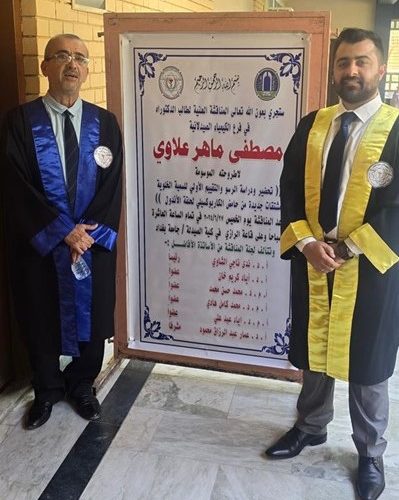The College of Pharmacy discussed the PhD dissertation entitled “New Indole-6-Carboxylic acid derivatives as Antiproliferative Agents:- Synthesis, In silico Studies and Cytotoxicity Evaluation”, by the student Mustafa Mahir Allawi and the supervisor, Professor Dr. Ammar A. Razzak Mahmood, at the Pharmaceutical chemistry Department. The study aimed to synthesize eleven new hydrazine-1-carbothioamide derivatives of indole-6-carboxylic acid and methyl-1-methyl-1H-indole-6-carboxylate that act as EGFR tyrosine kinase inhibitors, and ten new oxadiazole derivatives of indole-6-carboxylic acid and methyl-1-methyl-1H-indole-6-carboxylate that act as VEGFR tyrosine kinase inhibitors, The study included Synthesis indole derivatives and are deduced through molecular docking studies. These derivatives were characterized by different chemical and spectroscopic methods (IR, 1HNMR, 13CNMR and HRMS), and evaluated in vitro for their antiproliferative activities against A549, HeLa, HepG2, HT-29, and HCT-116 cancer cell lines. The results showed that according to in silico studies, compounds 3b and 9a showed good binding energy to EGFR and the best docking scores among the hydrazine-1-carbothioamide derivatives, and its TD50 value was comparable to that of Erlotinib. While, in vitro studies showed that compounds 3b and 6e were the most cytotoxic among the two groups of derivatives. Compounds (3b,9a) and (6e,11c) are cancer-selective agents based on their selectivity (SI). Compounds (3b,9a) and (6e,11c) targeted EGFR and VEGFR, respectively, inhibiting their kinas activity. The study recommended that the kinetics and the stability of the intended compounds in biological fluids and Conducting ADMET analysis in vitro and compare the findings with in silico results.



